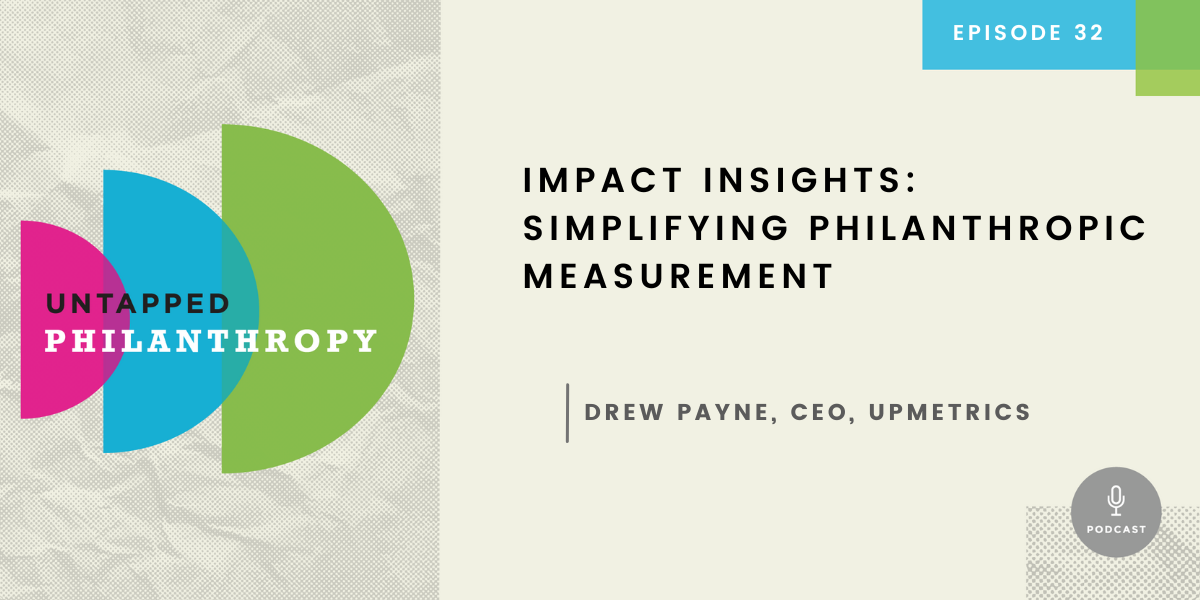Introducing Coffee, Tea, & Philanthropy: Inspiring Conversations on Impact
Join Bill Campbell in Coffee, Tea, & Philanthropy, exploring stories of changemakers and their impact in communities worldwide over a cup of coffee...
Be the first to know about new Fluxx grants management resources, blog articles and podcasts.

Kerrin chatted with Drew Payne, CEO and founder of UpMetrics, whose platform supports organizations with impact data to drive learning and also activate and inspire through storytelling.
For UpMetrics, the system and structure of what Drew and his team are doing is not just around giving people the ability to start to tell stories, but more importantly how to empower them to leverage impact measurement to action. Drew explains it in detail:
“I think that one of the challenges that the sector has experienced around impact measurement and management specifically is that it's been overly complex. And so what we try to do at UpMetrics is to apply a framework and a methodology that simplifies that process.
Starting with your “why” to better understand what success looks like for you as an organization we work through a framework that incorporates your vision, your mission, your core values as an organization, and then tie that to who you're looking to serve. What does that delivery model look like? What is quality delivery to you? And then the most important part is anyone better off based on the model that you're delivering? As we develop the impact framework, we get to know the organization and their purpose, combining longitudinal success metrics with quantitative components.”
To some, there can be a certain level of trepidation on embarking on a journey of impact measurement, and where to start. Drew’s approach is to create trust through building relationships and learning space. That process typically starts with understanding the motivation of the foundation's leadership team, connecting their own lived experiences to the impact work that the foundation is taking on across select issue areas. From there, as Drew puts it:
“...we'll take those specific issue areas and we'll break that down into understanding who are the beneficiaries? How do you define the quality of the delivery that you're applying into the communities? And then is anyone better off? And so we try to be really consistent with that impact framework approach. And that could be with a large foundation that's been around for 20, 30 years, or it could be a small grassroots nonprofit that's doing hyperlocal work within the community, but that's our general approach that we look to take, in addition to making sure that there is cross pollination and learning taking place across the organization.”
What makes UpMetrics unique is the platform’s ability to break down the traditional information silos that have existed in philanthropy. Through the platform, grantee partners are able to provide real time information to the grantmakers to drive deeper, more genuine relationships with a learning lens versus once a year reporting driven by the grant makers. It also represents a shift from the typical one way reporting which tends to be transactional to more learning with your partners towards longer term goals.
The idea of making this shift, and building a framework for impact measurement can be something that poses many challenges and obstacles to getting to an end state that works. Kerrin posed a poignant question about what pitfalls that organizations should be wary of when looking to build this framework. Drew talks about simplification:
“I think simplify - thinking about how (organizations) are contributing to positive change versus the attribution side of it. As you can get started on this impact measurement management journey, there's no shortage of data. So really think about aligning with your vision, the mission, the issue areas that you're taking on and dig into that data that aligns to that impact framework that you develop and recognize that it's going to be iterative as well. And then for the funders out there, I think that a lot of times we are putting pressure on the grantees to measure impact and in some cases are requiring through top-down mechanisms, longitudinal studies that can be pretty expensive and complex, which I think there's space for that and the research side of it, but I would also say that to walk the walk as funders around how we're defining impact and being open to that.”
For Drew and the whole team at UpMetrics, simplifying the complex is part of what is critical around impact measurement. Having that in place with a solid framework, will help scale impact more effectively with a learning lens.
Listen to the audio above to hear Kerrin and Drew’s entire discussion. To learn more about UpMetrics, please visit their website at https://upmetrics.com/
Episodes of Untapped Philanthropy are released monthly and always shared on the Fluxx blog. We encourage you to subscribe to the Fluxx blog to stay up to date on new episode releases and follow us on social media for podcast excerpts and more!
For a comprehensive list of all Untapped Philanthropy episodes, visit the Fluxx blog, or your favorite podcast listening station, including Apple Podcasts and Spotify.
Download the transcript here.
Join Bill Campbell in Coffee, Tea, & Philanthropy, exploring stories of changemakers and their impact in communities worldwide over a cup of coffee...
Free grant management software may seem cost-effective, but it often falls short for foundations. Discover the hidden costs and why investing in paid...
Increasingly, foundations and other grantmakers are turning to the power of data to help navigate the complexities of making change in a...
Be the first to know about new Fluxx grants management resources, blog articles and podcasts.